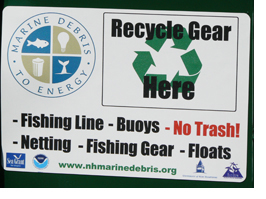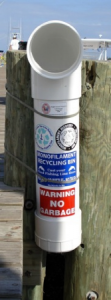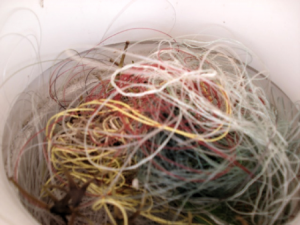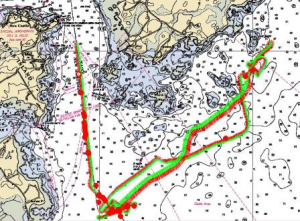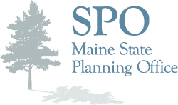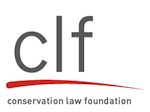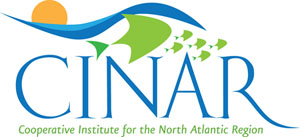New Hampshire fishermen will find a number of outlets this spring at which to dispose of their gear and make a positive impact on the marine environment.
Derelict fishing gear bins will be available in three new ports to encourage fishermen to responsibly dispose of derelict fishing gear such as nets, rope and line.
A sign in New Hampshire indicating the location for recycling derelict fishing gear with a list of appropriate deposits. (Photo: Blue Ocean Society.)
The project is a National Oceanic Atmospheric Administration-funded collaboration between the Blue Ocean Society for Marine Conservation, N.H. Sea Grant, University of New Hampshire (UNH) Cooperative Extension, and Dr. Jenna Jambeck of the University of Georgia (formerly of UNH).
Additionally, these partners will expand their fishing line recycling program by installing more monofilament fishing line recycling bins at New Hampshire marinas and working with charter fishing vessels to recycle more monofilament.
“Monofilament fishing line is said to take about 600 years to break down,” said Jen Kennedy, Executive Director of the Blue Ocean Society for Marine Conservation. The society has conducted monthly beach cleanups along the New England coast since 2001.
A typical monofilament recycling bin. (Photo: Jenna Jambeck.)
“Discarded monofilament is a common sight along our beaches, and can also entangle whales and other marine life. Recycling monofilament is an easy step any fisherman can take to help the marine environment,” Kennedy added.
Marine Debris to Energy Project Results
During the initial two years of the project, which concluded in fall 2009, project partners installed the first derelict fishing gear bin in New Hampshire, which has collected around 6 tons of fishing gear to date.
The bin is sponsored by Waste Management, and the used gear is transported to Wheelabrator Technologies for combustion, where it is turned into energy.
With the help of the Boat U.S. Reel In & Recycle program, five monofilament fishing line recycling bins were installed at Hampton state pier, Rye Harbor, Wentworth Marina, Peirce Island in Portsmouth and Great Bay Marine in Newington, New Hampshire. Volunteers monitored the recycling bins and collected more than 20 pounds of monofilament for recycling.
In addition, the first ever sonar survey specifically to look for derelict gear was conducted in New Hampshire waters aboard the R/V Gulf Challenger with support from L-3 Klein Associates, resulting in the identification of more than 300 “ghost” lobster traps off the mouth of Portsmouth Harbor.
The group wanted an innovative way to house all the data from the project and provide project updates and educational materials. So they worked with Michael Toepfer and Shane Bradt at UNH Cooperative Extension to develop a unique web portal, www.nhmarinedebris.org.
Visitors can go to the site and view the top five litter items collected at more than 20 New Hampshire beaches over the years, pelagic litter (any litter spotted out at sea) sightings recorded from whale watch vessels, a compilation of beach cleanup data for each site and year, derelict gear sightings and still images and results from the sonar survey.
Expansion of the project: More derelict gear bins, sonar surveys
All of the activities conducted in the first two years of the project will expand in the coming years with additional NOAA funding that will continue the project into 2011. The organizations expect the amount of “ghost” gear recycled and used in waste-to-energy to significantly increase. More sonar surveys will also be completed.
A collection of monofilament line. (Photo: Jenna Jambeck.)
“We intend to work with L-3 Klein to continue the sonar surveys, hopefully covering the rest of the N.H. coast. We’re anxious to survey the rest of the coast and begin discussions that will hopefully lead toward eventual removal of the battered gear that lies along the ocean bottom,” said Kennedy.
This spring partners plan to install three additional derelict fishing gear bins in New Hampshire, located at the Atlantic Offshore Lobstermen’s Association dock in Newington, and the commercial fish piers in Portsmouth and Rye. A kick-off celebration is planned for April.
The group will also expand its fishing line recycling program, employ a program assistant to work with marinas in installing bins in visible locations, and work with charter fishing boats to ask them to encourage customers to recycle their fishing line.
Cooperative Extension staff continue to work on the web site, experimenting with new web interfaces to make the information most accessible to educators, resource managers and the general public. They hope that it will turn into a more comprehensive resource for marine debris in the entire Gulf of Maine, and are in the process of working with local teachers to finalize lesson plans for K-12 educators, as well.
(Photo: Blue Ocean Society.)jen@blueoceansociety.org or Ken LaValley, NH Sea Grant, 603-862-4343 or ken.lavalley@unh.edu.
Print
